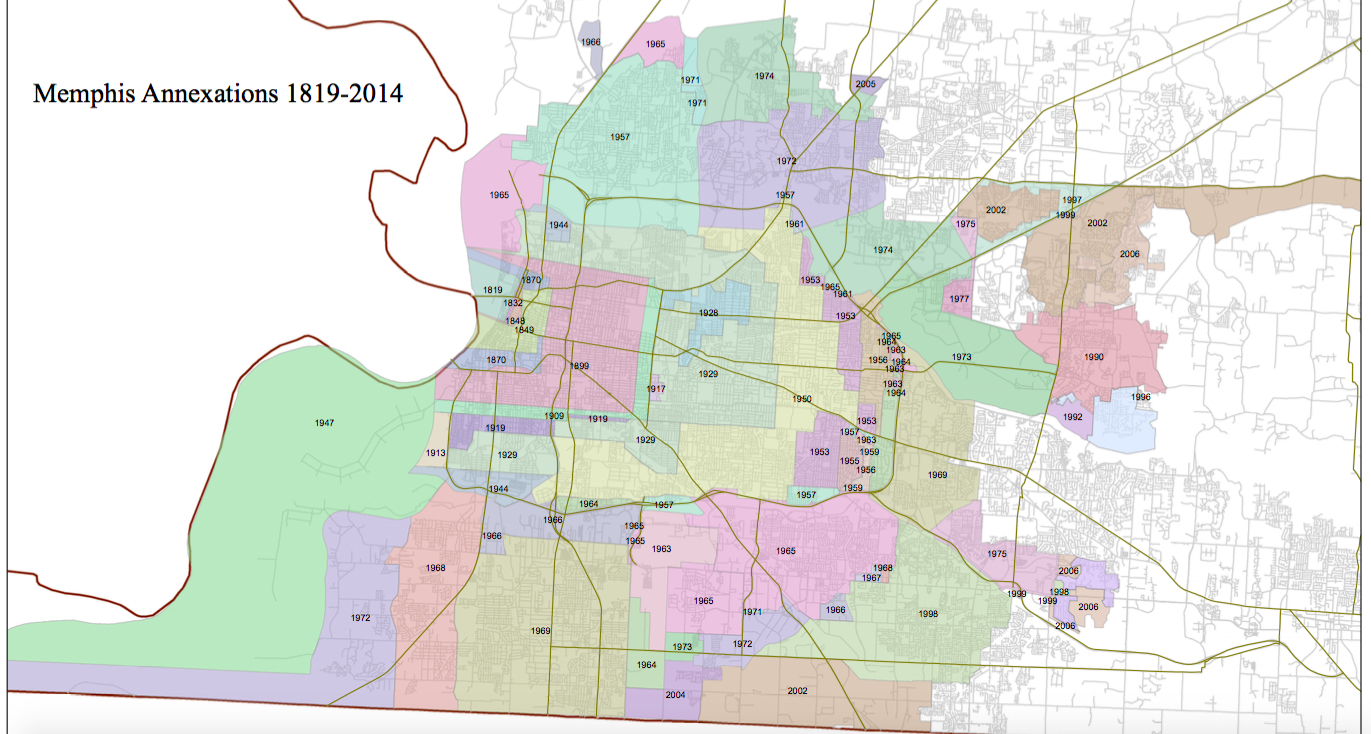Connecting state and local government leaders
Mayor Jim Strickland and others are interested in "de-annexing" parts of the city.
WASHINGTON — Local lawmakers in Memphis, Tennessee are moving ahead with plans to downsize the city’s footprint.
For years, Memphis gobbled up land through a process known as “annexation,” more than doubling the city’s area. Mayor Jim Strickland says providing services like public transportation and law enforcement within this sprawl is an expensive challenge.
“Memphis grew, actually from the very beginning 200 years ago, by annexing,” Strickland said at an event here on Wednesday. “The days of annexation are over and we’ve now paid a price. We have no density and it’s really hard to deliver services.”
Some numbers help illustrate what Strickland’s talking about. Between 1960 and 2016, the city’s area grew by about 150 percent, to 340 square miles from 135 square miles. Over that same time period, the number of Memphis residents increased as well, to 646,800 from 505,500.
The population increase was not enough to stay in proportion with the city’s ballooning boundaries. As a result, population density fell to 1,902 people per square mile in 2016, from 3,371 people per square mile in 1960, city figures show.

Memphis, located on the Mississippi River in western Tennessee, now has nearly the same number or residents as Boston, but occupies about seven times as much territory.
Strickland and others want to see this dynamic change. Last year, a task force made up of officials from the mayor’s office, the city council and surrounding Shelby County, released a plan that identified seven areas that could be “de-annexed,” or trimmed from the city.
A pair of ordinances are now pending before the City Council that would de-annex two of those areas. One is a roughly 18.9 square-mile uninhabited tract, known as River Bottoms. The other area, called Eads, has roughly 172 residents and covers about 3.4 square miles.
Once de-annexed, the areas would become part of unincorporated Shelby County.
Under the city’s current plan, the Eads de-annexation would go into effect on Jan. 1, 2020, giving Memphis time to adjust to any loss in revenues, or other fallout. Until then, residents in Eads would continue paying taxes and voting in city elections as they do now.
Council votes slated for May 22 on the two pieces of legislation were delayed due to concerns a council member had related to city debt payments.
Strickland is optimistic the council will consider it soon. “I think in the next 30 days, we’ll get that done,” he said.
For some people living in Eads, getting cut loose from the city would be welcomed.
Nancy Wimmer, an area resident, told local news station WREG-TV this month that she and everyone else she knows supports the move and that since Memphis annexed Eads in 1995, city services have fallen short. "We haven't gotten the sewers,” Wimmer said. “We also don't have the fire station that was supposed to be put on Houston Levee.”
One criteria for selecting areas for possible de-annexation in Memphis, Strickland explained, was whether residents in those places had sought out that option.
Of the seven areas identified for possible de-annexation in the task force plan, two are no longer under consideration, according to a spokesman for the mayor’s office.
If the city were to de-annex Eads, River Bottoms and the other three areas that are still on the table, Memphis would shed nearly 7,000 residents and about 27 square miles of land.
It also stands to lose about $8.4 million in tax collections and other revenue, but would save about $1.5 million in fiscal year 2020, according to task force estimates from last year.
Strickland stressed that a $7 million dent in Memphis’ budget would not be inconsequential and said this is one reason it is important for the city to have a few years to transition toward finalizing any de-annexations. General fund revenues in Memphis totaled about $590 million in fiscal year 2017, according to a city financial report.
Local governments analysts with S&P Global Ratings said by email on Thursday “it is too early to gauge the potential credit impact of Memphis officials’ proposal to revise their city’s boundaries.” S&P currently assigns the city a AA rating, with a stable outlook.
Georgia has drawn national attention in recent weeks for controversial state de-annexation legislation, which could reshape the city of Stockbridge.
In the backdrop of the Memphis effort, some Tennessee state lawmakers have backed legislation that would allow residents in certain areas to hold votes on seceding from cities.
One draft of the bill, Strickland said, would have opened the door for about 20 percent of Memphis’ population to de-annex themselves from the city within 18 months of time, a possibility that the mayor described as a potentially “devastating” blow to the city’s tax base.
Strickland supports another version of the legislation that cleared the state Senate in 2017 and included an exemption option for cities that develop their own de-annexation plans.
Tennessee’s state legislative session ended in April and for now the future of the legislation is unclear. In the meantime, Strickland said, Memphis is “going to plow ahead with our own plan.” He added: “I think we can de-annex areas and better serve our remaining citizens.”
Bill Lucia is a Senior Reporter for Government Executive's Route Fifty and is based in Washington, D.C.

NEXT STORY: How Exposed Is Your State to Trade Tensions?




